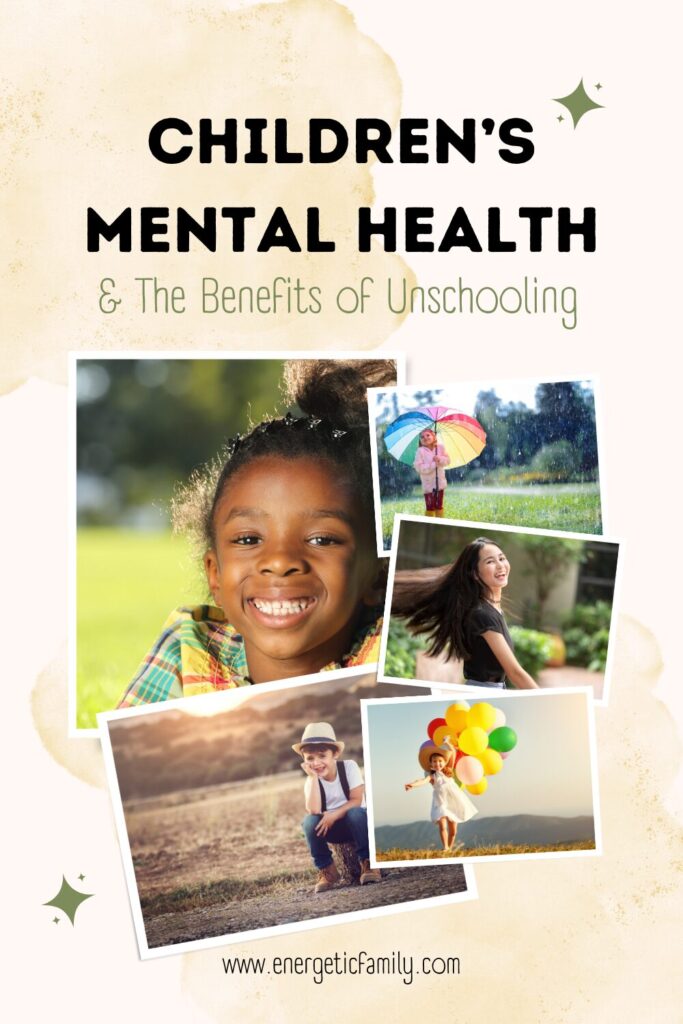Children’s mental health must be a top priority for the conscious parent. Our world is an increasingly challenging place for children to grow up. Where their spirits are craving simplicity, slow rhythms, innocent engagement with their environment, and authentic attachment, society is serving up fast-paced complexity, colored by political agendas, toxic social media culture, and extensive time away from parents due to the rigorous demands of school, organized sports, clubs and lessons.
The weightiness of this version of life weighs heavily on children, challenging their mental health in many ways.
Yet, children’s mental health is a crucial aspect of their overall well-being, influencing their emotional, psychological, and social development. It is critical that we not look away from the impact of our family choices on the mental health of our children. As we accept radical ownership over our lifestyle choices, we open ourselves to exploring new expressions of living that will support and protect our children in the ways that are most critical to their mental (and spiritual and emotional) well-being.
As society becomes more aware of mental health issues, it’s essential to explore how various lifestyle and educational approaches support or hinder children’s unique developmental needs.
The Importance of Children’s Mental Health
Mental health in children encompasses their ability to navigate emotions, form healthy relationships, and handle the challenges of growing up. According to the World Health Organization, mental health problems affect 10-20% of children and adolescents worldwide.
Issues such as anxiety, depression, and ADHD are becoming increasingly prevalent, often exacerbated by traditional schooling pressures like testing/grading, rigid curriculums, too much time sitting still indoors, polarized social agendas and complex peer dynamics.
Today, we’re looking at how Unschooling, in particular, can proactively support and nurture robust mental health in our children.
Unschooling: the Way Forward
Unschooling emphasizes a learner-directed approach and pace to life. Rather than following a structured curriculum, children pursue their interests and learn through life experiences, play, natural curiosity, and within the proximity of their parents.
The unschooling philosophy is built on the understanding that children are naturally curious and capable of directing their own learning if provided with a safe, supportive, and loving environment.
This foundation of trust in is a huge contributor to the child’s sense of inner worth and self-confidence, because they have been guided to trust themselves to navigate life, rather than waiting on external directives or interventions to do the choosing for them.
How Unschooling Supports Mental Health
- Reduces Academic Pressure: Traditional schools often impose significant academic pressure on children, leading to stress and anxiety. Unschooling eliminates the need for testing, grades and rigid routines, allowing children to learn at their own pace without the fear of failure. This reduction in pressure can lead to lower anxiety levels and a healthier approach to learning.
- Fosters Intrinsic Motivation: Unschooling encourages children to pursue their interests, which fosters intrinsic motivation. When children are genuinely interested in what they are learning, they are naturally engaged and enthusiastic – no coercion necessary. This engagement can boost their self-esteem and provide a sense of accomplishment, contributing to better mental health.
- Enhances Emotional Well-Being: By allowing children to follow their passions and interests, unschooling helps them develop a strong sense of identity and self-worth. Children have the freedom to explore their emotions and interests without judgment, promoting emotional intelligence and resilience.
- Promotes Healthy Social Interactions: Socialization in traditional schools can be challenging, with escalating issues like bullying and peer pressure negatively impacting mental health. Unschooling provides a more flexible social environment where children can interact with a diverse age group in various settings, leading to healthier and more meaningful social relationships.
- Encourages Lifelong Learning: The unschooling philosophy instills a love for learning that goes beyond formal education. Children learn to view education as a continuous, enjoyable process rather than a series of compulsory tasks. This attitude can lead to better mental health by reducing the stress associated with traditional academic achievements and arbitrary objectives, instead promoting a balanced, lifelong pursuit of knowledge, meaningful occupations, and aligned self-expression.

Practical Tips for Unschooling Parents
- Create a Nurturing Environment: Provide a safe and supportive space where your children feel comfortable exploring their interests. Encourage open communication and remain responsive to their shifting emotional needs.
- Be a Facilitator, Not a Director: Instead of dictating what and how your child “should” learn, act as a facilitator who provides resources and opportunities for exploration. Trust your child’s natural curiosity and abilities.
- Connect with Unschooling Communities: Engage with other unschooling families to share life-experiences, resources, and support. Community connections can provide both children and parents with a broader support network that feels empowering, in a world so strongly patterned by different values.
- Embrace Flexibility: Be open to change and adapt your approach to learning together based on your child’s evolving interests and needs. Flexibility is key to responding effectively to your child’s developmental stages and mental health needs.
- Focus on Holistic Development: Pay attention to all aspects of your child’s development, including physical, emotional, social, and intellectual growth. Encourage activities that promote overall well-being, such as outdoor play, healthy eating, creative arts, and mindfulness practices.
Leading Edge
Unschooling offers a unique and effective way to support children’s mental health and developmental needs.
By fostering a love for learning, reducing stress, and promoting emotional well-being, unschooling can help children grow into well-rounded, resilient adults.
As awareness of children’s mental health continues to grow, exploring alternative educational approaches like unschooling will provide valuable insights into nurturing happier, healthier children and teens… parents, you are on the leading edge of tomorrow, because of the choices you are making today!

Check out what Ben and Bonnie have to say about the Parent as Gatekeeper for a Child’s Social Exposure on this dynamic podcast episode!

